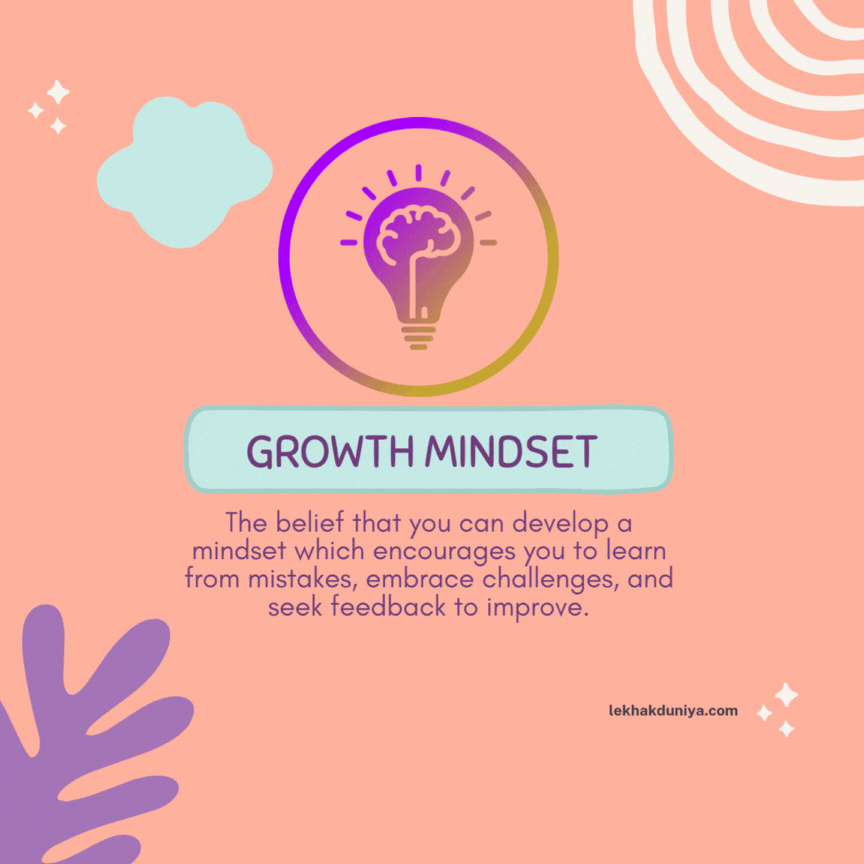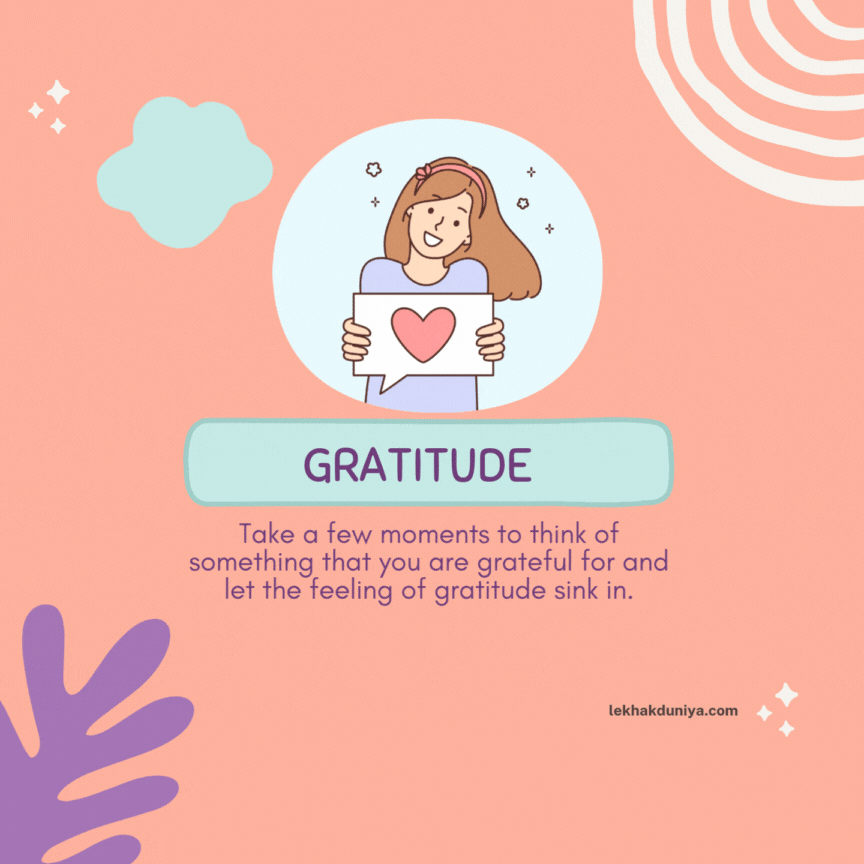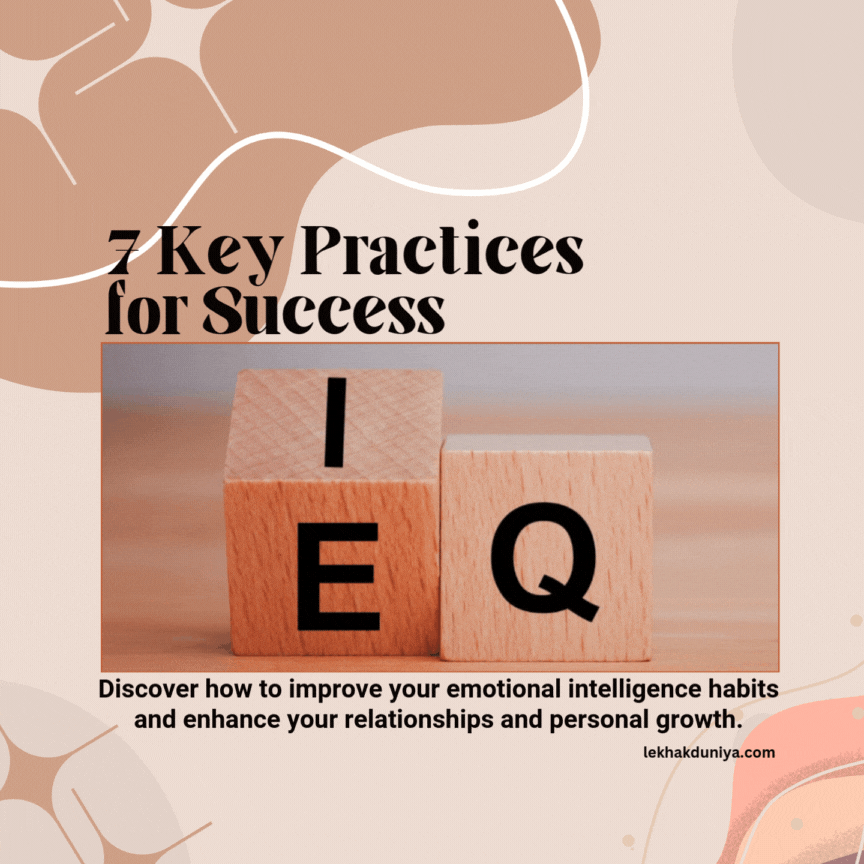In today’s fast-paced, high-pressure world, emotional intelligence is no longer a luxury—it’s a necessity. The way you manage your emotions, react to challenges, and handle interpersonal relationships plays an important role in your success, personally or professionally. But did you know that emotional intelligence habits aren’t something you’re just born with? You can cultivate it with daily practices that help sharpen your emotional skills.
In this blog post, you will explore actionable habits that help you develop emotional intelligence. These emotional intelligence habits can be integrated into your daily routine and practiced consistently to build stronger emotional skills. Whether you’re just starting your EQ journey or looking to enhance existing skills, these habits will offer guidance, on how to navigate emotional complexities with ease and confidence.

Let’s dive into these emotional intelligence habits, why they matter, and the key practices you can adopt to boost your emotional intelligence.
Table of Contents
What is Self-Awareness?
Self-awareness is about recognizing and understanding your own emotions. It’s the ability to see how your feelings affect your thoughts and behaviors, and how they influence how you interact with others.

Why it’s important:
Self-awareness is the foundation of all other emotional intelligence habits. Without it, you can’t manage your emotions effectively. Think about it: how often do you react without realizing why you’re feeling a certain way? By becoming more self-aware, you gain better control over your actions, improving your decision-making and reducing impulsive reactions.
Key Practices for Building Self-Awareness:
- Journaling: Spend a few minutes each day writing about your emotions and what triggered them. This habit helps you notice patterns in your reactions.
- Mindfulness: Take time to sit quietly and observe your thoughts without judgment. This builds emotional awareness and helps you stay in tune with how you’re feeling throughout the day.
- Reflection: At the end of the day review how you reacted to situations. Ask yourself: What was I feeling? How did that emotion affect my behavior?
Practicing self-awareness daily is one of the most crucial emotional intelligence habits that leads to better emotional control and improved relationships.
What is Emotion Management?
Emotion management refers to your ability to regulate your feelings, especially in stressful or challenging situations. It’s not about suppressing emotions but healthily managing them.

Why it’s important:
Managing your emotions effectively is one of the most essential emotional intelligence habits. Whether you’re dealing with frustration at work or conflict in your personal life, how you handle your emotions determines the outcome of the situation. Emotionally intelligent people don’t let their feelings control them; they respond thoughtfully instead of reacting impulsively.
Key Practices for Managing Emotions:
- Breathing exercises: When you feel overwhelmed, slow, deep breathing can calm your mind and reduce stress. This is a simple, yet powerful, way to manage emotions.
- Pause before reacting: Whenever you’re in an emotionally charged situation, give yourself a few seconds to pause and reflect before responding. This helps you avoid impulsive reactions.
- Meditation: Regular meditation practices increase emotional regulation by helping you stay present and in control of your emotions.
Mastering emotion management is one of the most effective emotional intelligence habits for staying calm and composed, even under pressure.
What is Empathy?
Empathy is about understanding and sharing how others feel. It means stepping into another person’s shoes to gain insight into their experiences and viewpoints.

Why it’s important:
Empathy is one of the most powerful emotional intelligence habits because it improves your relationships with others. People who practice empathy are better at building trust, resolving conflicts, and creating deeper connections. Empathy fosters better communication and understanding whether in personal relationships or at work.
Key Practices for Cultivating Empathy:
- Active listening: Pay attention when someone is speaking without interrupting or planning your response. Focus on understanding their emotions, not just their words.
- Ask open-ended questions: Encourage others to share their thoughts and feelings by asking questions like “How did that make you feel?” or “What challenged you the most during this journey?”
- Practice perspective-taking: Regularly put yourself in someone else’s position and ask yourself, “How would I feel in their situation?”
Making empathy one of your daily emotional intelligence habits will enhance your relationships, allowing you to connect with others on a deeper, more meaningful level.
What is Effective Communication?
Effective communication is about expressing your thoughts and emotions clearly while also understanding the emotions of others. It goes beyond words—good communicators also pay attention to non-verbal cues like body language and tone of voice.

Why it’s important:
Communication is one of the most vital emotional intelligence habits. Emotionally intelligent people are not only great at expressing themselves but also excel at interpreting the emotions of others. This reduces misunderstandings, fosters positive relationships, and helps to resolve conflicts quickly.
Key Practices for Improving Communication:
- Use “I” statements: Instead of blaming others, use statements like “I feel…” to express your emotions. For example, “I feel upset when deadlines are missed,” rather than, “You always miss deadlines.”
- Watch body language: Pay attention to your and others’ body language. Non-verbal cues often reveal more about a person’s emotions than their words do.
- Be a reflective listener: Repeat what someone has said to you, ensuring you understand their message correctly. For example, you could say, “It sounds like the workload is frustrating you—am I correct?”
Practicing effective communication is one of the most crucial emotional intelligence habits for building strong relationships and ensuring that you’re heard and understood.
What is a Growth Mindset for Emotional Intelligence?
A growth mindset for emotional intelligence is the belief that you can develop your EQ through effort and practice. This mindset encourages you to learn from mistakes, embrace challenges, and seek feedback to improve.

Why it’s important:
A growth mindset is one of the key emotional intelligence habits because it helps you embrace challenges and learn from failures. Instead of getting stuck in a fixed mindset (“I’m just not good with emotions”), a growth mindset shifts your thinking to, “I can improve my emotional intelligence over time.”
Key Practices for Developing a Growth Mindset:
- Embrace challenges: View setbacks as opportunities to grow emotionally. For example, if you struggle with anger, see difficult situations as chances to improve your emotional control.
- Seek feedback: Regularly ask others how they perceive your emotional responses and be open to constructive criticism.
- Learn from mistakes: After an emotionally challenging situation, reflect on what went wrong and how you can handle it better next time.
Adopting a growth mindset is one of the most transformative emotional intelligence habits because it empowers you to continually improve and develop your EQ.
What is Adaptability in Emotional Intelligence?
Adaptability refers to your ability to adjust to changing circumstances without losing emotional control. It’s about staying flexible and open-minded in the face of uncertainty.

Why it’s important:
Adaptability is one of the most valuable emotional intelligence habits in today’s fast-paced world. Whether you’re dealing with last-minute changes at work or unexpected life events, being adaptable allows you to navigate these challenges without becoming overwhelmed or stressed.
Key Practices for Staying Adaptable:
- Reframe challenges: When faced with an unexpected situation, shift your mindset to view it as an opportunity for growth rather than a setback.
- Stay calm under pressure: Practice deep breathing or other relaxation techniques to help you remain calm in stressful situations.
- Embrace flexibility: Learn to go with the flow. Instead of resisting change, ask yourself, “How can I make the most of this situation?”
Practicing adaptability will help you stay emotionally balanced, even when things don’t go according to plan, making it one of the most important emotional intelligence habits for personal and professional success.
What are Gratitude and Positive Thinking?
Gratitude and positive thinking are about focusing on what’s going well in your life rather than dwelling on the negatives. It’s the practice of consciously shifting your mindset to appreciate the good around you.

Why it’s important:
Practicing gratitude is one of the simplest but most effective emotional intelligence habits. It rewires your brain to focus on the positives, which reduces stress and improves overall emotional well-being. When you’re thankful, it’s easier to maintain a positive outlook, even during tough times.
Key Practices for Gratitude and Positivity:
- Gratitude journaling: Every day, write down three things you’re grateful for, no matter how small. This habit shifts your focus away from negativity.
- Express appreciation: Make it a habit to verbally thank people in life. Whether it’s a colleague who helped with a project or a friend who listened to you, expressing gratitude builds stronger relationships.
- Reframe negative thoughts: When something goes wrong, consciously shift your thinking to, “What can I learn from this?” or “What’s one good thing that came out of this?”
Integrating gratitude into your daily life is one of the most impactful emotional intelligence habits, fostering a positive mindset and improving your mental health.
Final Thoughts
Developing emotional intelligence is not something that happens overnight, but by adopting these seven habits, you can steadily improve your EQ over time. Whether it is practicing self-awareness, mastering empathy, or embracing a growth mindset, these habits will help you manage your emotions better, build stronger relationships, and achieve greater personal and professional success.
Start with one or two emotional intelligence habits and gradually incorporate more into your routine. Over time, these small changes in emotional intelligence habits will lead to a big transformation in your life.
FAQ: Emotional Intelligence Habits
Q1. What are emotional intelligence habits?
Ans: Emotional intelligence habits are daily practices that help you recognize, understand, and manage your emotions more effectively. These habits also include improving how you relate to and empathize with others. Regularly practicing habits like self-awareness, empathy, and emotion management, can improve your emotional intelligence over time.
Q2. How can I improve my emotional intelligence through daily habits?
Ans: You can improve your emotional intelligence by incorporating key emotional intelligence habits into your daily routine. Start with simple practices like self-reflection, journaling, or deep breathing. Over time, build up to more complex habits such as practicing empathy, improving communication, and maintaining a growth mindset.
Q3. Why are emotional intelligence habits important for success?
Ans: Emotional intelligence habits are essential for success because they help you navigate personal and professional relationships more effectively. People with high emotional intelligence are better at managing stress, resolving conflicts, and leading teams. These habits also promote mental well-being and reduce the chances of burnout.
Q4. How long does it take to develop emotional intelligence habits?
Ans: Developing emotional intelligence habits takes time and consistency. It’s a gradual process that requires daily practice. However, with dedication, you can start seeing improvements in your emotional intelligence within a few weeks, especially if you focus on key habits like emotion management and self-awareness.
Q5. Can emotional intelligence habits improve mental health?
Ans: Yes, practicing emotional intelligence habits can greatly improve mental health. By managing your emotions better and cultivating a positive mindset, you reduce stress and anxiety. These habits also promote emotional resilience, helping you cope with life’s challenges in a healthier way.




Jinx Manga I appreciate you sharing this blog post. Thanks Again. Cool.
excellent points altogether, you simply gained a brand new reader. What would you suggest in regards to your post that you made some days ago? Any positive?